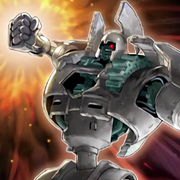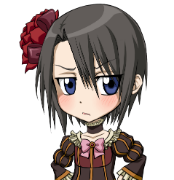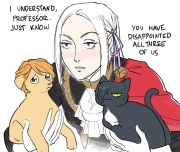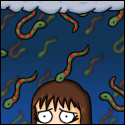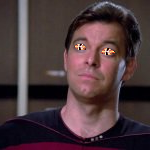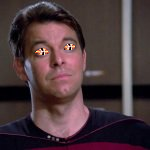|
The game thinks immortality is lame and mortality is sick as hell, warts and all. Perhaps only us foolish mortals with our fleeting transient lives will be able to create a world of hope and inspiration, that can overcome any hardship and withstand the strongest despiair. It's kinda a straightforward philosophy imo. E: Game just be trying to present "being human" and living life as best you can as something inspiring and worthwhile. Which I think fits its vibe pretty well. SyntheticPolygon fucked around with this message at 15:04 on Dec 8, 2021 |
|
|
|

|
| # ? May 20, 2024 04:28 |
|
Harrow posted:Also full MSQ spoiler, somewhat related to this: To answer your question here Zodiark is constantly creating to counteract the Dynamis, he creates Aether, creatures, life, love. He's repairing the celestial Aetheric field to stop Dynamis from getting into Eithyris. When he's gone the weakened areas are weakened again and Dynamis gets through. Hydaelyn shattering the world creates 14 crystal shards of the original, static in that they're not continued growth. She also literally can't stop Dynamis because she cannot create/propogate more Aether the way Zodiark does. But also Dark and Light being mixed up is fine in part because Zodiark does exactly what he's made to do, he recreates paradise, which is creation, Venat is able to have Hydaelyn shatter the world but can't think her way to a better future than flee on her own she needs someone else to take the proactive choice of fighting. She mires the world in static misery but doesn't capture the people in it. Zodiark's very existence recreates the failing laws of reality. Hydaelyn in turn locks Zodiark in stasis, whilst Venat is the one to shatter the world because Zodiark is much more powerful and made of far more ancients. It's like how Shiva and Ysayle can be slightly separate personality/people despite there being no real difference between the person and the Primal. Lord_Magmar fucked around with this message at 15:19 on Dec 8, 2021 |
|
|
|
Zone six: lmaoooooooo I had no loving idea that my idea of "hey, let's play Sage this expansion and cosplay as Omega-M and only ride our Model O all expansion" would pay off like this I literally had someone send me a tell in the first part of it asking if I'd been glammed like this all expansion or if I was just being a particularly sadistic rear end in a top hat tromping around the Dragonstar on the back of their conqueror 
|
|
|
|
SyntheticPolygon posted:The game thinks immortality is lame and mortality is sick as hell, warts and all. Full Endwalker: I don't think this really follows when you have immortal species like the dragons also hanging around. They aren't criticized for their immortality; instead, we mortals are urged to consider their perspective and step out of our own. After having time to sit on it, I'm more okay with the Hydaelyn thing than I was when I first played the game, where I shared many of PoorWeather's problems with the theme, (also, sorry, Endorph, but your reaction to PoorWeather's point that empathy doesn't necessarily correlate to suffering is really needlessly hostile) but it's from focusing moreso on the part where she admits what she had done was cruel and unjust. Essentially, Venat and Emet made the exact same choices and are on the exact same moral standing - it's only that, through no fault of his own, Emet had less information. Both were thinking about what version of humanity would stand the best chance of fighting against the Sound, and having made their decision, chose to wipe out the version that didn't 'pass their test'. The Sundered version of humanity was more equipped to be able to fight dynamis through something more or less arbitrary - it's not like it's the Ancients' fault for being born with stupid amounts of aether - and something I think is uncomfortable to assign a strict moral lesson or 'answer', so to speak, to. Again, Emet did not have the information Venat had. This is why they're basically shown as a united front at the end, with Emet complaining about how Venat knew everything he would do and everything he would go through and counted on him doing it so he'd be there at the end to save us. They both made painful decisions to do absolutely horrible things for what they saw as the greater good and their hands are covered in blood for it, as per the Venat visual, but in the end, both were crucial figures in defeating Meteion, and are portrayed as fundamentally good people. Obviously there's an unsubtle theme about the dangers of seeking an escape from pain entirely or the idea and expectation that everything is fixable. It is very clumsily handled sometimes, but the intent was mostly good, I think. It's a hard balance to strike without coming up against "suffering is virtuous, and trying to make things better is bad, and there's a hard limit on progress." Honestly, I think the portrayal of Venat's decision to Sunder wasn't handled very well, because it came across like she was taking it upon herself to violently punish her people for feeling very human emotions. It's not like the desire to escape sadness goes away just because you're mortal. Raelle fucked around with this message at 15:21 on Dec 8, 2021 |
|
|
|
I will say that the way that EW portrays Venat's summoning of Hydaelyn feels way, way more morally ambiguous than I thought it would be, where it's now motivated more by her future knowledge than objection to what the ancients were doing per se. I think for me because she is portrayed now as acting alone, instead of as any group, and immediately after Zodiark's summoning while the world is still burning, vs some time after when things were normal the discussion turns to returning the world to how it was. Of course you could argue this isn't exactly what is happening but dramatic metaphor, but it does muddy the waters in a way that I don't think was necessary? Also on muddying the waters of the theme, all the talk of suffering yet you never experience any this expansion. It's the suffering of others that gets you to the end, the ancients, the people of Garlemald and Radz-at-Han, but you get off entirely scott free, and it rings more hollow to me now on reflection than it did last night. Well I guess there's my personally suffering at Zenos being in the story  but I get the impression you were supposed to like all that. but I get the impression you were supposed to like all that.
|
|
|
|
Raelle posted:Honestly, I think the portrayal of Venat's decision to Sunder wasn't handled very well, because it came across like she was taking it upon herself to violently punish her people for feeling very human emotions. Yeah that scene, I think, needed a stronger reminder of the context around it that we learned in Shadowbringers. They would need to continue sacrificing countless lives to Zodiark, creating more and more suffering, to keep him doing what he was doing. That is why Venat felt there was no other option but to remove the possibility of going back. But the scene depicts it as though she did it as a snap decision in the moment in the midst of the Final Days itself and kind of confuses the issue. It was a clumsily-handled scene in service of what was still a good emotional payoff.
|
|
|
|
Eimi posted:I will say that the way that EW portrays Venat's summoning of Hydaelyn feels way, way more morally ambiguous than I thought it would be, where it's now motivated more by her future knowledge than objection to what the ancients were doing per se. I think for me because she is portrayed now as acting alone, instead of as any group, and immediately after Zodiark's summoning while the world is still burning, vs some time after when things were normal the discussion turns to returning the world to how it was. Of course you could argue this isn't exactly what is happening but dramatic metaphor, but it does muddy the waters in a way that I don't think was necessary? Ehhhh the context of the final zone is that you don't actually know if you can save the Scions. You suffer their loss deeply, deeply enough that you end up nearly collapsing before pushing onwards to the end. It pays off, you get your friends back, but you still suffered their loss and pushed on in spite of it. Also Zenos in the story is a good counterpart, because he in turn doesn't let himself get bogged down in the misery of his life (dude has issues, literaly only feels alive when he's having a death match with the WoL). He's a counterpart because where the Warrior of Light moves on in hope, Zenos moves on in like, anti-hope. Not despair but it's certainly not hope, perhaps determination to see things through? It works I think, he came all this way for you, and you don't have to accept but you do ultimately have to stop him from doing anything else now that he's the only thing left.
|
|
|
|
Harrow posted:Also full MSQ spoiler, somewhat related to this: Summoning Zodiark sucked up a ton of the dark, creative, chaotic aether into the magical ozone layer, leaving the elements of stasis out of balance on the surface. Hydaelyn sucked up those elements, leaving the shattered world balanced but aether-deprived in general. I guess. PoorWeather posted:
Well, that's what trauma does to a person. Unconstructive, antisocial, lashing out like a wounded animal. Very sad.
|
|
|
|
Harrow posted:Yeah that scene, I think, needed a stronger reminder of the context around it that we learned in Shadowbringers. They would need to continue sacrificing countless lives to Zodiark, creating more and more suffering, to keep him doing what he was doing. That is why Venat felt there was no other option but to remove the possibility of going back. But the scene depicts it as though she did it as a snap decision in the moment in the midst of the Final Days itself and kind of confuses the issue. It was a clumsily-handled scene in service of what was still a good emotional payoff. This gets even more confused because, frankly, when the Warrior of Light explained everything to she, Emet, and Hythlodaeus, Venat is still baffled as to why she would choose to do what she did, and oppose the Convocation's decisions. Presumably we included the story about continuous sacrifices. The future knowledge being the primary driving force is the only thing that really makes sense with that in mind; yes, it's clear Venat also felt disappointed and angry that her people didn't miraculously 'overcome' their sorrow and grief, but yeah, that part was really clumsy and chose Thematic Anvils Set To Dramatic Song moreso than adhering to the actual character logic, and it took a while for me to be able to unpack.
|
|
|
|
Eimi posted:I will say that the way that EW portrays Venat's summoning of Hydaelyn feels way, way more morally ambiguous than I thought it would be, where it's now motivated more by her future knowledge than objection to what the ancients were doing per se. I think for me because she is portrayed now as acting alone, instead of as any group, and immediately after Zodiark's summoning while the world is still burning, vs some time after when things were normal the discussion turns to returning the world to how it was. Of course you could argue this isn't exactly what is happening but dramatic metaphor, but it does muddy the waters in a way that I don't think was necessary? I didn't read that scene as her summoning Hydaelyn, personally. I read it as her basically announcing her creed and her intentions, and then she will go on to become Hydaelyn later. It's basically a soliloquy in a play, more for us the audience rather than the in-universe crowd.
|
|
|
|
Eimi posted:Also on muddying the waters of the theme, all the talk of suffering yet you never experience any this expansion. It's the suffering of others that gets you to the end, the ancients, the people of Garlemald and Radz-at-Han, but you get off entirely scott free, and it rings more hollow to me now on reflection than it did last night. Well I guess there's my personally suffering at Zenos being in the story Lord_Magmar posted:Ehhhh the context of the final zone is that you don't actually know if you can save the Scions. You suffer their loss deeply, deeply enough that you end up nearly collapsing before pushing onwards to the end. It pays off, you get your friends back, but you still suffered their loss and pushed on in spite of it. Also Zenos in the story is a good counterpart, because he in turn doesn't let himself get bogged down in the misery of his life (dude has issues, literaly only feels alive when he's having a death match with the WoL). He's a counterpart because where the Warrior of Light moves on in hope, Zenos moves on in like, anti-hope. Not despair but it's certainly not hope, perhaps determination to see things through? It works I think, he came all this way for you, and you don't have to accept but you do ultimately have to stop him from doing anything else now that he's the only thing left. Final zone spoilers: This is probably one of those times when difference the player character's perspective and the player's perspective might make it hard to sell what the character is supposed to be going through in that moment. From the Warrior of Light's perspective, they have the power to bring their friends back in the palm of their hand, but they can't or the whole universe will suffer, so they have to press on alone. From the player's perspective, we know there's no way they'd give us that much setup of "hey you can use that stone to give souls material form again" if they weren't going to use it, and also, they absolutely weren't going to kill off all of the Scions--even at its darkest, no Final Fantasy has ever been that grim. So we, as players, know that everyone's coming back, but the Warrior of Light doesn't. I think we're also supposed to consider the pain and loss that the Warrior of Light has suffered throughout the whole story, not just in Endwalker specifically, though admittedly that can be challenging to keep in perspective if you've experienced the story over the course of several years and haven't revisited some of it in a while. Very end spoilers: Also, honestly I thought Zenos coming back was dumb as hell, but I started to be a lot more sold on him when I saw what his role in this expansion was. I thought they were going to make him the main villain again somehow, when actually he spent the whole time wandering around searching for meaning, being called out on his own failings, until he finally goes to the end of the loving universe just to find the one thing he actually cares about. I went into the expansion rolling my eyes at Zenos and wishing he wasn't there, and at the end, I was still rolling my eyes at Zenos but I was having fun doing it, and yeah, I picked the "you're right, this is fun" option at the end.
|
|
|
|
Harrow posted:Very end spoilers: Yeah Zenos is a reflection of the WoL, and the planets that Metieon encountered. Because for him there is no meaning in life, he doesn't feel hope or joy or happiness or pleasure, he's basically dead, the perfect example of Meteions issue. Except Zenos spends the expansion trying to reach that one perfect moment again, living in the past fight of the WoL, until finally he gets it through his pretty, pretty head that he needs to move forward. He needs to find a way to get what he wants without simply wallowing in melancholy but actively assisting the future so he can fight his friend. In fact the Omicrons have his exact issue, he's the strongest person he knows, so what challenge is their left (in Stormblood) and then when he finds that challenge (the WoL) he ultimately commits suicide after his transcendental moment of perfect happiness, and then when he's brought back seeks that same moment again with no care for anything else. If he'd won he'd have potentially ended just like Stigma.
|
|
|
|
Harrow posted:Final zone spoilers: Yeah, and I feel it's something that stands out, when for the rest of the expansion they did a REALLY good job of making the WoL act as a cipher for the player, even more so than they usually do. So to me as a player, it made that whole zone feel hollow because I knew by laws of dramatic convention there was no loving way it'd stick. Part of that was we weren't separate for long, it was like one quick sequence til the gang was back together so you never felt their absence. They were never missing long enough to truly notice. Also because while I don't care to compare the WoL to Zenos, I do love to do so to Emet, and I think it would've been wonderful poetic storytelling if the end of our journey mirror the end of his, given how much else the ending can kind of feel like a repeat of ShB. Have the Scions be lost early on, ensure that there are parts where their talents would've been useful but we don't have access to them, we have to go alone. Eventually by the end we do that slow walk, but it'd been built up to it, only with the detail of us slouched over, carrying the weight of the world. Have a reverse trial where the Meteions fight us 8 to 1, us arguing against their chorus of voices. Just really sell us feeling like Emet, the last hero of his people against the universe. And then you can resume the ending playing out from Emet and Hyth's summoning. Granted this is my stupid fanfiction so it probably sucks but that's an ending that would've stuck stronger for me.
|
|
|
|
Thundarr posted:I can see how you took that away from the story, but I don't quite agree. What Venat does isn't presented as an unambiguously good thing, but an ethically complicated thing that she feels is necessary based on her knowledge of the future. Hell, that cutscene where she's marching through time past angry and hurting people while becoming increasingly covered in grime? That's not even subtext. She hates that what she did caused so much pain. The Scions appreciate that her becoming Hydaelin enabled them to exist in the first place and then protect their world, but I don't think any of them are saying how cool they think it is that a lot of people suffered so they they could have rad adventures. I think this is probably subjective to some extent, but though the narrative flirts a little with portraying Hydaelyn as a morally ambiguous character in the framing, it never really felt sincere about it? Like, with the accompanying monologue about how it will ultimately make mankind stronger and more virtuous, the walking-through-muck scene feels like a partial condemnation of her and more like something playing up how much she's suffered or how many burdens she's taken on to do what is ultimately the right thing. Likewise, every conversation from either the perspective of the Scions, or even just the tone of things like the quest log narration, emphasize the weight of her sacrifice and burden, and the ultimate righteousness of her actions. But the narrative fails to sell what she did as righteous to the extent it really needs to. Like, what Hydaelyn did was by far the most spectacular act of mass-murder and infliction of suffering in the entire setting - more than the Rejoinings, more than either of the two Final Days. She identity-killed every living being except for 3 people and permanently maimed humanity in body and mind forever against their collective will, and it feels like the story doesn't even wanna talk about it. Combined with how awkward and kinda contrived-feeling the time travel plot is to begin with (why didn't she do anything before the final days? why did she let the exact same scenario described to her play out? etc) and the fact that it's hard to believe there couldn't have been some other solution, considering how much the game normally emphasizes the fundamental goodness of people and their willingness to eventually change... And what you're left with is a situation where, even if it wasn't intended, the implication is that it's okay, and even heroic, to do some genocide if it's in service of having humans live the Correct Way. This is getting off-topic in terms of your post a bit, but I think if they really did want to sell the "immortality/no suffering fundamentally bad" plot point, it was a big mistake to have that be the natural state of mankind, and the sundered state the willfully-inflicted aberration. They try and sell Hydaelyn as a champion of everything and natural and right, the "soul of the planet" in a true sense, but her and the present-day status quo is an anomaly born of her own ego - her belief that she knew better than everyone else in the world, not even having shared the information that led her to that belief widely. Francis posted:[Well, that's what trauma does to a person. Unconstructive, antisocial, lashing out like a wounded animal. Very sad. C'mon, dude, please don't do this. Whether or not you're saying this literally or sardonically at my expense, that wasn't at all the point I was trying to make.
|
|
|
|
PoorWeather posted:This is getting off-topic in terms of your post a bit, but I think if they really did want to sell the "immortality/no suffering fundamentally bad" plot point, it was a big mistake to have that be the natural state of mankind, and the sundered state the willfully-inflicted aberration. They try and sell Hydaelyn as a champion of everything and natural and right, the "soul of the planet" in a true sense, but her and the present-day status quo is an anomaly born of her own ego - her belief that she knew better than everyone else in the world, not even having shared the information that led her to that belief widely. I think the idea there is that there was suffering, but the Ancients, powerful as they were, were blind to it. They were blind to the suffering they inflicted on the lifeforms they discarded for being flawed, and blind to the suffering of people like Hermes who weren't blissful in their mastery over their world. By the time Venat made her choice to sunder the world, the Ancients were inflicting even more suffering in an attempt to return to their previous bliss, sacrificing countless lives to power Zodiark. What she did clearly caused her agony and I'm not sure she was ever certain she truly made the right choice, but she saw what it would cost to return to even a shadow of what Meteion's Final Days had taken from them and decided that she had to remove the option to go back. I think we're still supposed to see the loss of the Ancient world as loss, as a sad thing. We see how beautiful it was, no more flawed than our current world, but still so beautiful. We even have the option for the WoL to say they think it's more beautiful. But the choice that Venat made wasn't a choice between "inflict suffering because suffering is necessary" and "go back to the beautiful world of before." That world was gone--Meteion had already ensured that. Venat picked a different way forward.
|
|
|
|
I don't think you're meant to take Venat/Hydaelyn's actions at the time as an objectively good solution, more of a best solution at the time that she could think of, just like summoning Zodiark. It's messed up but they were stuck in a rut and she had to fix the immediate issue rather than treating it at the source (because she couldn't), and that caused a lot of Problems for everyone. They say as much that it was a very imperfect solution and that it's up to us to properly fix things.
|
|
|
|
One thing I do think needs to be emphasized in this conversation is that Venat didn't destroy the Ancient world. Meteion did. Venat didn't have the power to bring back what was lost. Nobody could--even summoning Zodiark couldn't really bring it back, no matter how much was sacrificed in Zodiark's name. She saw that her society had chosen the path of trying to continue sacrificing to Zodiark anyway in a vain attempt to bring back something that was, sadly, irreversibly lost, and she picked a different path.
|
|
|
|
Harrow posted:Final zone spoilers: I think this is purpose of the voice lines that play while you are... Endwalking. A reminder of all the words of encouragement you've received across the entirety of your adventure, re-arranged into an affirming speech to rally yourself as you approach the end, by yourself but not alone. I grabbed a screenshot of the full text but forgot to upload it, I'll have to do that later And yes, I didn't check at the time but I hear from others that the debuff you get in that sequence to force walking speed is literally named Endwalker. Koji, you beautiful bastard.
|
|
|
|
Harrow posted:I think the idea there is that there was suffering, but the Ancients, powerful as they were, were blind to it. They were blind to the suffering they inflicted on the lifeforms they discarded for being flawed, and blind to the suffering of people like Hermes who weren't blissful in their mastery over their world. That's a pretty hard sell, I think, that Venat acted out of a desire to stop the Ancients from inflicting suffering, when she by her own admission births an insane amount of suffering by her actions. Her walk through the muck is her being surrounded by suffering, dying people - children weeping over dead bodies, starving to death, all of it. And we can't say Venat actually had an objection to the sacrifices in and of themselves, because she didn't understand why she turned against her fellow Ancients based on WoL's story, and she herself chose to sacrifice several people in order to give birth to Hydaelyn. Again, none of the Ancients' flaws were things that mortals were free of. At all. The only way Venat's character and decisions really work is when you filter them through her making her choices primarily out of utilitarianism and the future knowledge that she didn't share with others. Which is borne out by the text, but not from the framing or the tone. As PoorWeather points out, the tone of the game keeps trying to make her seem morally righteous because she's on our side, helping us out, and they want us to like her - it feels like very insecure writing, and it is unfortunate because it does become uncomfortable when "look at poor Venat's suffering" becomes the artistic centerpiece while she's trudging through piles of her victims, or raises her sword against people who committed the heinous crime of grieving their loved ones and wanting them back. It's okay that Venat made a very difficult, messed up decision. It's less okay when it feels like the narrative is one-sidedly cheerleading her for it, and the strongest condemnation she gets from anyone is one line from herself.
|
|
|
|
PoorWeather posted:I think this is probably subjective to some extent, but though the narrative flirts a little with portraying Hydaelyn as a morally ambiguous character in the framing, it never really felt sincere about it? Like, with the accompanying monologue about how it will ultimately make mankind stronger and more virtuous, the walking-through-muck scene feels like a partial condemnation of her and more like something playing up how much she's suffered or how many burdens she's taken on to do what is ultimately the right thing. Likewise, every conversation from either the perspective of the Scions, or even just the tone of things like the quest log narration, emphasize the weight of her sacrifice and burden, and the ultimate righteousness of her actions. I feel like this ignores that the other option was also doing a genocide, and that genocide wouldn’t fix the world ending catastrophe Like the choices were not a) mankind lives in blissful utopia forever and b) shattering the world into 14 shards It was a) the ancients sacrifice half the lives on the planet to bring back their dead friends while also setting themselves up for the exact same thing to happen again and b) shattering the world into 14 shards and also possibly preventing the same thing from happening again
|
|
|
|
Badger of Basra posted:I feel like this ignores that the other option was also doing a genocide, and that genocide wouldn’t fix the world ending catastrophe Yeah, but this comes down to, again, Venat having information that other people did not. Emet was also acting out of concern that Sundered humanity wouldn't be able to deal with the Sound if it were to happen again, based on what his understanding of the situation. It's not an indication of stronger morality either way. And evidence that even Venat didn't exactly have confidence that the Sundering was a sure thing to work out as far as leveling up peoples' dynamis, considering that Plan A was escape via the moon. What Venat did was essentially raise a bunch of people on a field of dead bodies she had killed, and subjecting them to repeated torture until they would become resistant enough to the torture enough to kill an apocalyptic space bird. Yes, they succeeded in killing the space bird, but given how few details we get as far as Venat trying other options before falling back on Sundering - the montage depicts it as a largely emotional reaction! - I think it's fair to side-eye the narrative trying to convince you she's Truly Good and Hated Torturing Us, Really and we should be grateful for her Belief In Us (to survive the torture)
|
|
|
|
where do you get the idea that she repeatedly and purposefully inflicted pain on people after the sundering? I read her weird metaphorical walk through people’s pain after the memory as being an acknowledgement that all this bad stuff will happen to people because they’re living in a worse world than the near utopia of Amaurot, but she didn’t purposefully cause peoples parents to hate them or create famines to test humanity or something
|
|
|
|
Harrow posted:I think the idea there is that there was suffering, but the Ancients, powerful as they were, were blind to it. They were blind to the suffering they inflicted on the lifeforms they discarded for being flawed, and blind to the suffering of people like Hermes who weren't blissful in their mastery over their world. I mean, I get that was what the writers probably intended, but their delivery of that concept ended up feeling profoundly uncomfortable to me. There's no other scenario in which the story ever presents mass-murder or inflicting suffering on others as an acceptable solution to a problem. The Ascians rejoinings, the Garleans uniting of the world by force, the Dragonification of Ishgard, numerous more low-key examples like how it treats the Skulls in the Ala Mhigo plot - the story is fundamentally anti-extremist, for good or ill, except for this one instance. It always asks you to consider that people are not monoliths, that social situations are complicated and tied up with cultural baggage that can usually be wound down if you're patient, that empathy for people at the complicated fringes of society and the world is critical. Venat made a unilateral choice to kill everyone in the world. That might've included a majority of Zodiark worshippers who wanted to drive their civilization off a cliff bringing back the dead, but it inevitably also included dissenters like Hermes. Children without any ideology. People in other nations that had nothing to do with Amaurot or the summoning at all. She made an absolute judgement that they were incapable of ever getting over their poo poo and resolving the problem through defeating Meteion themselves, and forced her ideology upon all of them violently. If the story felt like it was interested in portraying that as the dubious, in many ways misguided action it was, I'd have no problem with it - but it almost outright tells us we ought to revere her for taking on that burden. It never seriously presents the position that she did the wrong thing in legitimate light. It's creepy. And why it feels like there's that undercurrent of "people ought to suffer for their own good" in the core of EW's morality - because she occupies that exceptional moral status in the world, having done the thing we're told repeatedly is wrong and yet going more or less uncondemned. Badger of Basra posted:I feel like this ignores that the other option was also doing a genocide, and that genocide wouldn’t fix the world ending catastrophe Again, just to iterate in this context too - I get this at a conceptual level, but the fact that they wrote a scenario where she had to do a genocide, and then is lionized for it, feels screwed up and weird because it's literally the only time they do that. FFXIV isn't generally a setting where people have to make bitterly hard, utilitarian choices, it's one where idealism usually triumphs and there's usually a third option that can put things to rights if you take a step back. (And in the few cases where there isn't, like in Emet's arc, the active party - the one changing the status quo violently - is the one who gets condemned.) But in contrast to all of that, they portray what Venat did in a broadly idealistic, favorable light where she was motivated by "Love", even though it was clearly cold and utilitarian at best. It's that dissonance which is uncomfortable. PoorWeather fucked around with this message at 16:41 on Dec 8, 2021 |
|
|
|
Badger of Basra posted:where do you get the idea that she repeatedly and purposefully inflicted pain on people after the sundering? I read her weird metaphorical walk through people’s pain after the memory as being an acknowledgement that all this bad stuff will happen to people because they’re living in a worse world than the near utopia of Amaurot, but she didn’t purposefully cause peoples parents to hate them or create famines to test humanity or something She created a world in which great suffering has the capacity to exist. She didn't cause any suffering, she allowed it to happen and did nothing to stop it or change it. I breathe fire and torment because I sundered the world and now the people who come after will suffer because of what I've done, even if I don't do anything else.
|
|
|
|
Raelle posted:That's a pretty hard sell, I think, that Venat acted out of a desire to stop the Ancients from inflicting suffering, when she by her own admission births an insane amount of suffering by her actions. Her walk through the muck is her being surrounded by suffering, dying people - children weeping over dead bodies, starving to death, all of it. And we can't say Venat actually had an objection to the sacrifices in and of themselves, because she didn't understand why she turned against her fellow Ancients based on WoL's story, and she herself chose to sacrifice several people in order to give birth to Hydaelyn. Again, none of the Ancients' flaws were things that mortals were free of. At all. I agree that the scene itself is poorly represented, for sure. Though I did add to that post because the part you quoted was an incomplete argument and didn't get across what I was trying to say. I think what's lost in this conversation is that the Ancient world was already lost. There was no bringing it back. Meteion's Final Days had doomed them, one way or another, no matter what path they chose. What the Ancients were doing with Zodiark wouldn't have worked. They'd have been on a treadmill of trying to turn back the clock, yearning for what was irreversibly lost, forever, or at least until they finally gave up or ran out of things to sacrifice. I don't think we're supposed to see Venat's choice as rejecting the very idea that reclaiming their old world would be good. I explained that really poorly in that post, I think. It's instead to point out that you can't reclaim that world. It's gone. No amount of sacrifice could ever bring it back, but that's what the Ancients were going to try anyway. So Venat makes something new in the hopes that the new lives can someday find a better path forward--even with her future knowledge, she has no idea how this is all going to turn out or whether Meteion can actually be stopped. I'm also not sure who's going to condemn her, of the characters in the story. For the most part, the lives we encounter aren't sundered Ancient souls--only people with the Echo are that. For everyone else, they wouldn't even exist had Venat not sundered the world, and that includes almost all of the Scions, and the countless lives on the Source and in all of its reflections. Meanwhile, at the end when we hear from Emet-Selch and Hythlodaeus, they're only able to comment on Venat's actions from the perspective of, well... poo poo, it got us here, and that's a lot farther than their previous methods would've taken them. Maybe it did work. Raelle posted:What Venat did was essentially raise a bunch of people on a field of dead bodies she had killed, and subjecting them to repeated torture until they would become resistant enough to the torture enough to kill an apocalyptic space bird. Yes, they succeeded in killing the space bird, but given how few details we get as far as Venat trying other options before falling back on Sundering - the montage depicts it as a largely emotional reaction! - I think it's fair to side-eye the narrative trying to convince you she's Truly Good and Hated Torturing Us, Really and we should be grateful for her Belief In Us (to survive the torture) You're phrasing this like Hydaelyn is out there in the aetherial sea intentionally reaching out to inflict suffering and pain constantly but that's not what she did. She sundered the world and then we see her throughout the whole game doing her best to guide the people of that world forward with what power she had left. Lord_Magmar posted:She created a world in which great suffering has the capacity to exist. She didn't cause any suffering, she allowed it to happen and did nothing to stop it or change it. I breathe fire and torment because I sundered the world and now the people who come after will suffer because of what I've done, even if I don't do anything else. While this is true, I still think people are just leaping over the idea that there was no perfect option there. It was a choice between "world full of suffering that would probably dwindle and die while vainly attempting to bring back something they absolutely could not" and "world full of suffering that could maybe, just maybe, grow and overcome." Again, though, I do want to reiterate that the actual scene is pretty clumsy and directly contradicts what we're told both before and after it. Incidentally, I actually think fairly straightforward specific change would have fixed it: just don't show her raising her sword and causing a huge beam of light. Cut from just before that to her walk through the darkness with all the blood around her and leave what happened in between off-screen.
|
|
|
|
Badger of Basra posted:where do you get the idea that she repeatedly and purposefully inflicted pain on people after the sundering? I read her weird metaphorical walk through people’s pain after the memory as being an acknowledgement that all this bad stuff will happen to people because they’re living in a worse world than the near utopia of Amaurot, but she didn’t purposefully cause peoples parents to hate them or create famines to test humanity or something The Sundering caused the entire environment where that suffering was even possible, and Venat did this knowingly - WoL told her everything, including the details of the conflict with Emet that ensued because he hated the consequences of the Sundering and all the pain it wrought. And both from the thematic viewpoint and the utilitarian viewpoint, Venat makes the big speech about how We Must Learn To Live With Suffering, It Is Our Constant Companion, Man Must Learn To Walk, whether because it keeps us from destroying ourselves, or because it's needed to level up our dynamis. People suffering more than they would have in the Unsundered world is the entire basis of her ideals and plan.
|
|
|
|
Harrow posted:I agree that the scene itself is poorly represented, for sure. this person said it better than me so I will just quote this post
|
|
|
|
To continue criticizing that specific scene, the very timeline of it makes no sense. The scene implies that Venat becomes Hydaelyn during the Final Days and before the summoning of Zodiark, which we know is just not true. It implies this because we see Hythlodaeus, who we know was one of the souls sacrificed to make Zodiark. He should not have been around at the time of the Sundering at all. If the scene was meant to metaphorically depict her choice, it was too literal in its presentation to do that. If it was meant to be literal, it messed up its own continuity.
|
|
|
|
Harrow posted:I'm also not sure who's going to condemn her, of the characters in the story. For the most part, the lives we encounter aren't sundered Ancient souls--only people with the Echo are that. For everyone else, they wouldn't even exist had Venat not sundered the world, and that includes almost all of the Scions, and the countless lives on the Source and in all of its reflections. Meanwhile, at the end when we hear from Emet-Selch and Hythlodaeus, they're only able to comment on Venat's actions from the perspective of, well... poo poo, it got us here, and that's a lot farther than their previous methods would've taken them. Maybe it did work. I think my problem with this is that it's Watsonian reasoning when my problem with the narrative is Doylist. The writers have absolute power over how the concepts and themes in the story are conveyed - even though there are barely any living ancients in the story, if they'd wanted us to understand Hydaelyn as an ambiguous character they considered genuinely worthy of condemnation (or rather, for condemning her to be painted as a morally valid perspective in-universe) for her mass murder and subsequent infliction of misery upon mankind, they could have found a way to communicate that to us through the framing and portrayal of events. Or hell, it would have been as easy as giving the WoL, who has the full story, the option to say "You're no different to Emet-Selch", or something. But... They don't. Which implies they don't think she's worthy of it themselves. Somebody fucked around with this message at 17:06 on Dec 8, 2021 |
|
|
|
Harrow posted:Though I did add to that post because the part you quoted was an incomplete argument and didn't get across what I was trying to say. I think what's lost in this conversation is that the Ancient world was already lost. There was no bringing it back. Meteion's Final Days had doomed them, one way or another, no matter what path they chose. What the Ancients were doing with Zodiark wouldn't have worked. They'd have been on a treadmill of trying to turn back the clock, yearning for what was irreversibly lost, forever, or at least until they finally gave up or ran out of things to sacrifice. This seems sort of a weird, fatalistic argument to me, since there were still a number of surviving Ancients who had no plans to roll over and die, and I don't see how Meteion had irrevocably doomed them anymore than it did the Sundered worlds when it came for them too. They had a plan in motion to restore life to Etheirys, if nothing else, and it's not like Venat made the choice to Sunder because it had been firmly demonstrated to her that their plan wasn't working - she Sundered before they even had the opportunity to try, and probably fail, and then explore other alternatives. Again, we don't get any sense of alternate options Venat might have tried, and how desperately she might have, through the nature of the montage. We can be fairly certain she didn't go to Emet-Selch, even though she should have known based on his character and their history that he would have at least taken her seriously and hear her out (though he'd throw a tantrum while doing it.) Also, I'm not sure about just completely dismissing "there's no way to get back the dead" in this setting, since we resurrect both the Scions and Emet/Hythlodaeus in the final sequences, and Emet and Hythlodaeus only bow out again because they choose to do so. The implication is that Hydaelyn's magic could have granted them a full revival if Emet still wasn't mad at her. Again, the Sundering happened before the Ancients could really do anything in the plan they had made for recovery, because Venat disliked the ideals it reflected, and because she had private knowledge about the nature of the Final Days that they did not. quote:I'm also not sure who's going to condemn her, of the characters in the story. For the most part, the lives we encounter aren't sundered Ancient souls--only people with the Echo are that. For everyone else, they wouldn't even exist had Venat not sundered the world, and that includes almost all of the Scions, and the countless lives on the Source and in all of its reflections. Meanwhile, at the end when we hear from Emet-Selch and Hythlodaeus, they're only able to comment on Venat's actions from the perspective of, well... poo poo, it got us here, and that's a lot farther than their previous methods would've taken them. Maybe it did work. I'd sort of hope that even people who aren't direct victims of a genocide would be able to, on some level, condemn that genocide. The Shards deserving to live now that they're here and that Venat did an absolutely horrible thing are compatible ideas, I think. quote:While this is true, I still think people are just leaping over the idea that [spoiler]there was no perfect option there. It was a choice between "world full of suffering that would probably dwindle and die while vainly attempting to bring back something they absolutely could not" and "world full of suffering that could maybe, just maybe, grow and overcome." Again, I can be sympathetic to the idea that Venat had an absolutely terrible choice to make. The issues here are a) the tone of the narrative, which firmly paints her as the most tragic victim of them all, and we should all be very grateful to her and love her very much, and b) the idea that she had the right to make that choice for everyone. If the majority of people want to give it their best shot through Zodiark, and were absolutely opposed to the Sundering, does she have the right to go through with it and tear their lives apart anyway - especially considering, again, the vast majority of people did not have the same information she did? Raelle fucked around with this message at 17:03 on Dec 8, 2021 |
|
|
|
Raelle posted:This seems sort of a weird, fatalistic argument to me, since there were still a number of surviving Ancients who had no plans to roll over and die, and I don't see how Meteion had irrevocably doomed them anymore than it did the Sundered worlds when it came for them too. They had a plan in motion to restore life to Etheirys, if nothing else, and it's not like Venat made the choice to Sunder because it had been firmly demonstrated to her that their plan wasn't working - she Sundered before they even had the opportunity to try, and probably fail, and then explore other alternatives. Again, we don't get any sense of alternate options Venat might have tried, and how desperately she might have, through the nature of the montage. We can be fairly certain she didn't go to Emet-Selch, even though she should have known based on his character and their history that he would have at least taken her seriously and hear her out (though he'd throw a tantrum while doing it.) I mean I'll allow for the possibility that I missed something, but what was the Ancients' plan for recovery beyond "keep feeding souls to Zodiark forever?" And how would they get back those who they had lost if their souls were now part of Zodiark? Though again, that whole scene was a mess so maybe the disconnect here is that I'm not taking what it depicts quite as literally, largely because what it depicts doesn't make sense. For example: Harrow posted:To continue criticizing that specific scene, the very timeline of it makes no sense. The scene implies that Venat becomes Hydaelyn during the Final Days and before the summoning of Zodiark, which we know is just not true. It implies this because we see Hythlodaeus, who we know was one of the souls sacrificed to make Zodiark. He should not have been around at the time of the Sundering at all. This is not to excuse it, either. I think it's a bad scene that undercuts the narrative we're told both before and after it.
|
|
|
|
On a completely different post-game note, the night theme for Radz at Han has, of all things, a guy hamming it up with a trombone and I love it.
|
|
|
|
Harrow posted:I mean I'll allow for the possibility that I missed something, but what was the Ancients' plan for recovery beyond "keep feeding souls to Zodiark forever?" And how would they get back those who they had lost if their souls were now part of Zodiark? The Hythlodaeus shade says that the plan is to nurture the newborn life Zodiark has created until Etheirys is flourishing again, and then sacrifice a portion of it to get their loved ones back. There's no implication Zodiark needed to be constantly fed souls--he simply needed fuel for when they wanted him to perform a huge, specific action, like creating life or shutting down the Sound. So once Zodiark got the Life wheels turning again, and they had gotten their loved ones back - which probably wouldn't have worked, though we don't know for sure - theoretically there shouldn't be any more need for sacrifices. Now, of course, we know with Endwalker that there would eventually have been, but they did not know that at the time because they didn't understand the origin of the Sound.
|
|
|
|
Harrow posted:To continue criticizing that specific scene, the very timeline of it makes no sense. The scene implies that Venat becomes Hydaelyn during the Final Days and before the summoning of Zodiark, which we know is just not true. It implies this because we see Hythlodaeus, who we know was one of the souls sacrificed to make Zodiark. He should not have been around at the time of the Sundering at all. i think you might be misunderstanding the timeline -- they literally have a lil speech like "oh great zodiark pls take our sacrifices and return us to the way we were!". there were two sorta final days -- the initial final days where they sacrificed half of the people for zodiark and bought some time, and then the second one where they were going to sacrifice more people, which venat was against (and not the only one against, see emet selch's cave speech). venat's sundering happens post-zodiark, with hythlodaeus and other a part of the crop of 2nd sacrifices (altho i'm less sure on that one, altho hythlodaeus is on the moon so  ). ).and re trauma vs empathy capabilities -- the real lesson that the game is trying to get across with suffering vs non-suffering and trauma imo, is that the way to strengthen empathy in the face of trauma is........connection to other people. and it's the same way irl, trauma is still suffering and pain, but with love, support, and human connection, it can be softened and allow for greater empathy moving forward. it's the lack of love, support, and human connection that allows it to turn into, well, zenos Gnossiennes fucked around with this message at 17:20 on Dec 8, 2021 |
|
|
|
Raelle posted:The Hythlodaeus shade says that the plan is to nurture the newborn life Zodiark has created until Etheirys is flourishing again, and then sacrifice a portion of it to get their loved ones back. There's no implication Zodiark needed to be constantly fed souls--he simply needed fuel for when they wanted him to perform a huge, specific action, like creating life or shutting down the Sound. So once Zodiark got the Life wheels turning again, and they had gotten their loved ones back - which probably wouldn't have worked, though we don't know for sure - theoretically there shouldn't be any more need for sacrifices. I could be misremembering but I remember learning in Amaurot that they did have to continue sacrificing—that even after half of them had died to call Zodiark, they ended up sacrificing even more to him after the fact, that there were other waves of sacrifices to Zodiark—though it’s been a good while since I’ve seen that scene so I’ll concede that I might be misremembering.
|
|
|
|
Harrow posted:I could be misremembering but I remember learning in Amaurot that they did have to continue sacrificing—that even after half of them had died to call Zodiark, they ended up sacrificing even more to him after the fact, that there were other waves of sacrifices to Zodiark—though it’s been a good while since I’ve seen that scene so I’ll concede that I might be misremembering. The two waves of sacrifices were to provide fuel for two separate specific tasks. After that, they intended to heal the world the "normal" way, and when it had recovered, get their loved ones out of Zodiark. Hythlodaeus posted:The Convocation of Fourteen─well, it was Thirteen at the time─endeavored to create a will for our star. They would repair the fundamental laws of order and halt the spread of destruction. As far as I can tell, constant maintenance sacrifices or plans for sacrifices after the third one weren't theoretically on the table. Of course, you can argue about Zodiark presenting the temptation of an easy out for any problem, and that Meteion would eventually break through the aether shield, necessitating more - but again, we can't know for sure how things would have played out because Venat Sundered them before they could even attempt stage three. Also, I think it's kind of worth noting that Endwalker confirms that those souls given to Zodiark aren't just "dead." They're stuck in him in a weird dreamlike state, unable to return to the star, which makes the urgency to get those people out of there more understandable. It's kind of a big ask to tell Emet to get over Hythlodaeus being trapped forever. Raelle fucked around with this message at 17:34 on Dec 8, 2021 |
|
|
|
Sacrifice 1, and this is Shadowbringers stuff, was to stop the final days. We know that now means repair or replenish the flow of celestial aether that was blocking the song of oblivion. This happened through a sacrifice of half the population. Sacrifice 2 was to repair the planet. Life was reseeded, and the planet could thrive again. This happened through the sacrifice of half of the remaining population. Sacrifice 3 was to restore the lost Amoroutians. It was to take place after the new life had been nurtured, and they would all be sacrificed to restore everything. This didn't happen.
|
|
|
|
Raelle posted:The two waves of sacrifices were to provide fuel for two separate specific tasks. After that, they intended to heal the world the "normal" way, and when it had recovered, get their loved ones out of Zodiark. Ah, thanks for quoting it. That does make sense. It also makes the Sundering scene in Endwalker even clumsier. I remembered there being a group of Ancients who worked together to summon Hydaelyn, and depicting it as Venat doing it solo flies in the face of that. I guess it's possible neither Hythlodaeus nor Emet-Selch knew the actual truth of how Venat did what she did and the Hythlodaeus shade was just telling us the story as Emet-Selch thought maybe it had gone? I guess my reading sorta depends on the idea that the Sundering scene we see is meant to be more metaphorical or symbolic than literal, because the alternative--that Hythlodaeus was around at the time when Venat became Hydaelyn, and that the Final Days were actively occurring (meaning Zodiark hadn't been summoned to shield Etheirys yet)--is provably false because we know that his soul was one of the ones that was part of Zodiark, and we know Zodiark's shield worked. Though really it's not a good scene even interpreted symbolically, either, but at least that way it doesn't actively conflict the timeline of events. Harrow fucked around with this message at 17:42 on Dec 8, 2021 |
|
|
|
The thing that really sticks in my craw about Venat's plan, even now is that she had full information including where the source of the Sound was coming from and proof in the form of a brand affixed to Meteion. The Ancients were trying to stabilize a situation where their planet was dying, but at no point is it implied that she tried to explain that she knew exactly what was causing the problem. After things were stabilized, it's possible that the Ancients would have turned to trying to solve the issue, but we'll never know because Venat trusted knowledge of the future instead of an unknown variable like the actions of her people after they were traumatized.
|
|
|
|

|
| # ? May 20, 2024 04:28 |
|
musouka posted:The thing that really sticks in my craw about Venat's plan, even now is that she had full information including where the source of the Sound was coming from and proof in the form of a brand affixed to Meteion. The Ancients were trying to stabilize a situation where their planet was dying, but at no point is it implied that she tried to explain that she knew exactly what was causing the problem. After things were stabilized, it's possible that the Ancients would have turned to trying to solve the issue, but we'll never know because Venat trusted knowledge of the future instead of an unknown variable like the actions of her people after they were traumatized. Time travel is sticky business.
|
|
|





